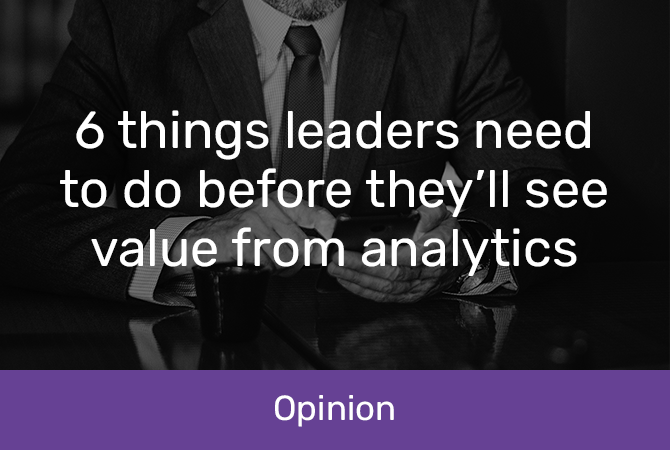
The 6 things leaders need to do before they'll see value from analytics
This is a message to leaders who have endorsed analytics in their organisations but are unsatisfied with the value being created. Datamine Founder Paul O'Connor offers his opinion on why this is likely occurring and the six areas leaders need to take action on in order to turn things around.
Analytics is becoming widely accepted as a method of business optimisation, and leaders from many different kinds of business are becoming endorsers of analytics. It’s often assumed that such an endorsement alone will be enough to get the ball rolling - an assumption that leaves many leaders disappointed six months down the road when no concrete value has been created yet.
![]() If you’ve endorsed and invested in analytics, great. That’s an important part of moving initiatives through the pipeline. However, it takes more than saying you support something for it to come to fruition and for value to be created. What you also need to do is create an environment in which analytics can succeed. That will be the factor ultimately driving value and change in an organisation. Here are my six pieces of advice to help leaders create an analytics-enabled environment:
If you’ve endorsed and invested in analytics, great. That’s an important part of moving initiatives through the pipeline. However, it takes more than saying you support something for it to come to fruition and for value to be created. What you also need to do is create an environment in which analytics can succeed. That will be the factor ultimately driving value and change in an organisation. Here are my six pieces of advice to help leaders create an analytics-enabled environment:
1. Be the budget champion for analytics initiatives
The money for analytics projects needs to come from somewhere. If you endorse analytics and believe in its value, be the person who ringfences budget for foundational initiatives. If you don’t, chances are the project will never have the funding to see the light of day.
2. Prioritise analytics during the planning phase
Analytics work is often deployed as a reactive measure to a challenge that has arisen during another endeavour - a way to fix things that have gone awry. If you really want to see long-term value from your initiatives, include consideration for analytics during the planning phase so that the value can be leveraged in a repeatable way.
3. Ensure you have the capability to deliver results
Before jumping headfirst into an analytics project, ensure you have the capacity and capability to complete it and implement the results. There’s no point investing time and resource into something that will run out of steam halfway through or, even worse, be impossible to put into action to get your desired outcome.
4. Ensure you have the data you need
It’s equally important to make sure you and your analyst team have access to all the data necessary to do the analysis. The freer the access, the better - have a conversation with IT or whoever else in your organisation might hold the data to figure out where it is and how it can be cleaned, organised and accessed in a safe but easy way.
5. Evaluate your current business processes
Analytics initiatives often inadvertently highlight (and are hindered by) inefficient business processes. Wherever possible, try to streamline or replace outdated parts of your processes that are manual and repetitive. Create smarter processes that can be deployed through your existing activities first before moving on to complete re-engineering.
6. Choose your analytics projects wisely
Rather than going for the quick win projects, focus first on the foundational projects that will deliver enduring value to your business. Make sure you’re investing in initiatives that will then enable subsequent initiatives - not one-off projects. And ensure you are talking about your analytics projects (both internally and externally) through case studies and testimonials.
![]() Endorsing analytics is more than just saying ‘I believe it’s valuable’. In order to truly endorse it, you have to pave the way for its successful implementation. The same concept applies to other technologies and processes that are new to a business - things like artificial intelligence, machine learning, robotic process automation etc.
Endorsing analytics is more than just saying ‘I believe it’s valuable’. In order to truly endorse it, you have to pave the way for its successful implementation. The same concept applies to other technologies and processes that are new to a business - things like artificial intelligence, machine learning, robotic process automation etc.
You can’t onboard any of these new and exciting technologies without first laying the foundation. That means good data, capable people who are willing and able to make a difference, and an organisation that is open to experimentation with analytics. The combination of all these factors will be the magic behind you truly seeing value from your efforts.
 ABOUT THE AUTHOR: PAUL O'CONNOR
ABOUT THE AUTHOR: PAUL O'CONNOR
Paul founded Datamine in 1995 and has overseen the company's growth into its current position as a key player in the data analytics community. He brings a human touch to data analysis, translating 'geek-speak' into English and never failing to turn the imponderable into actionable insights.















































